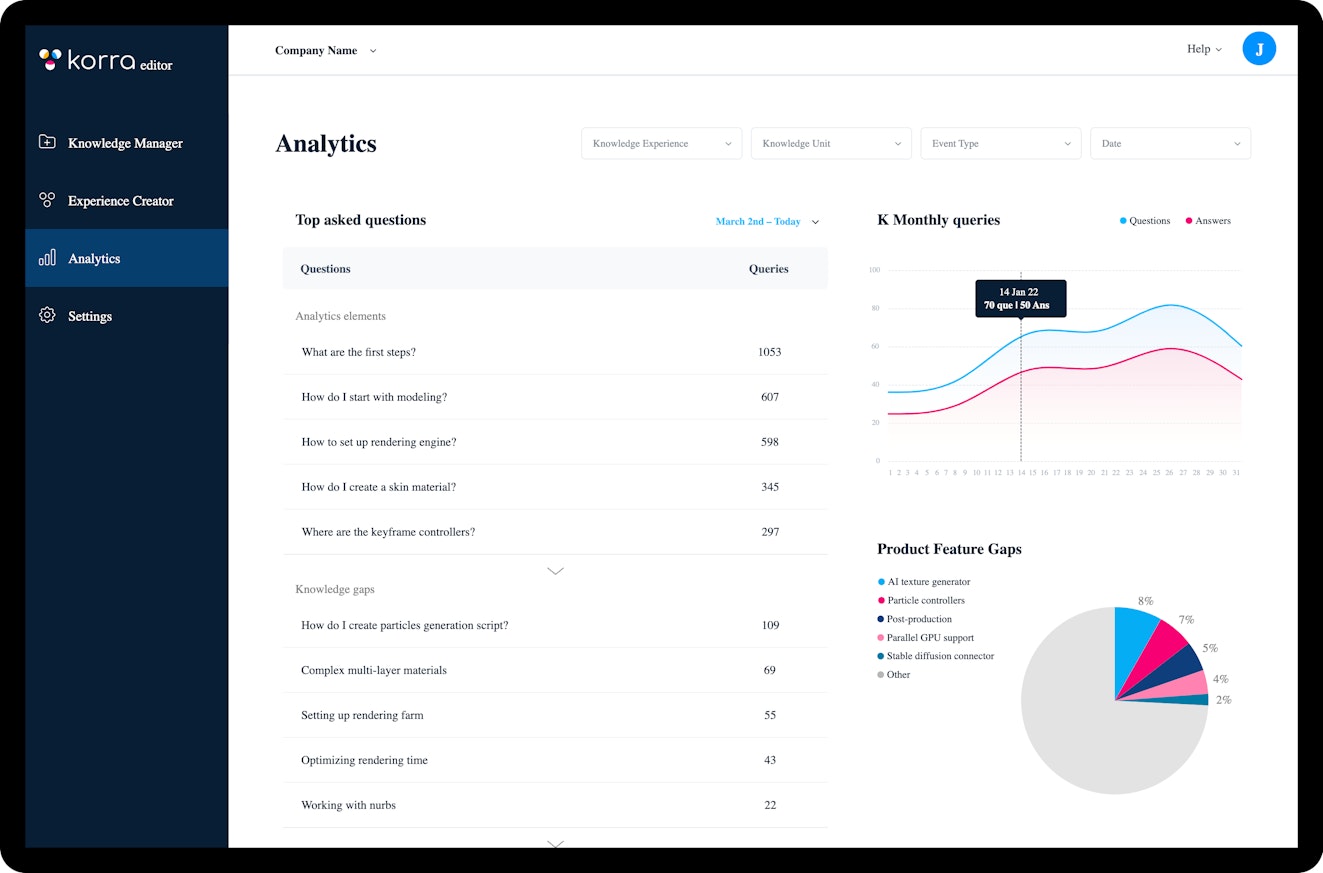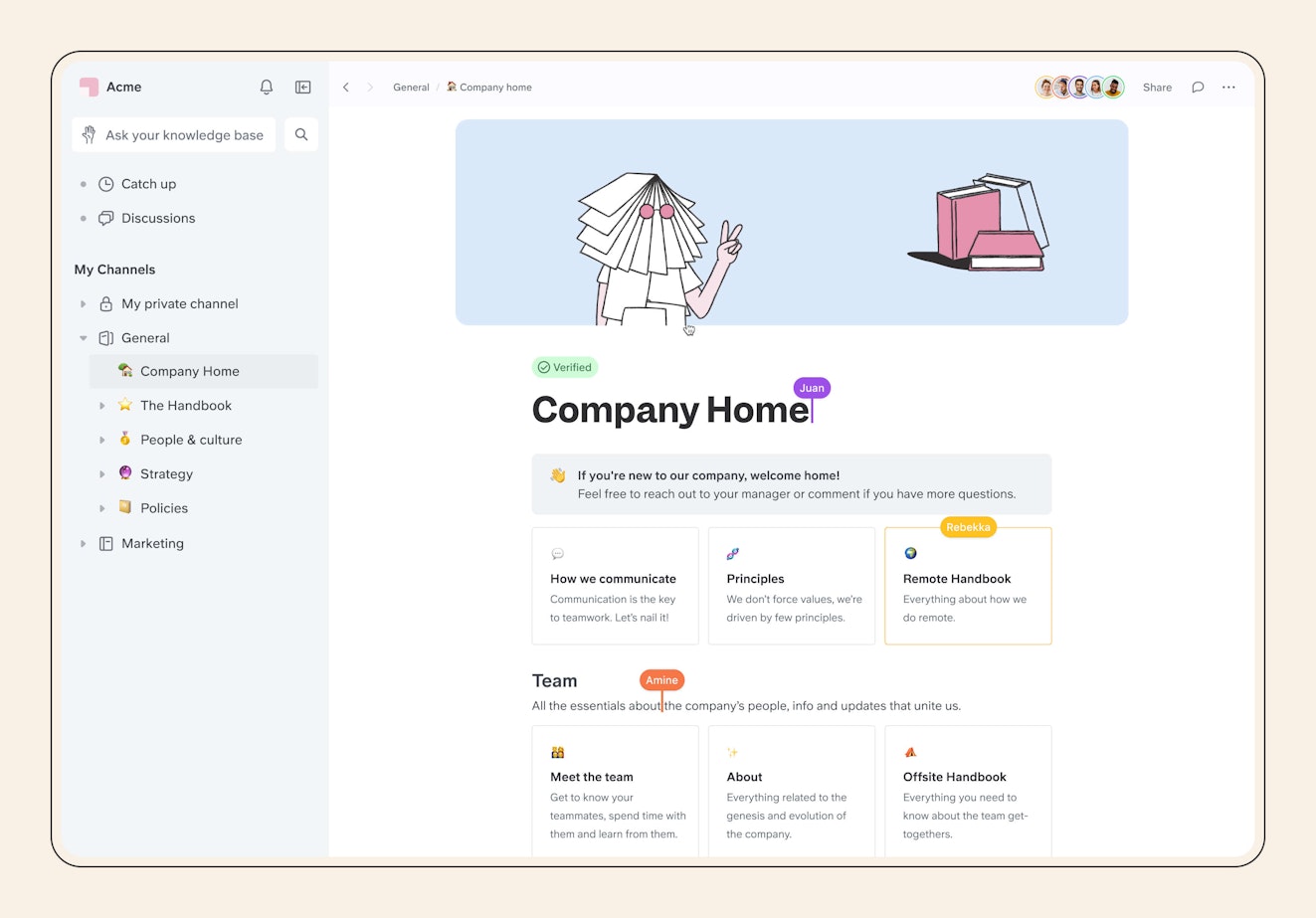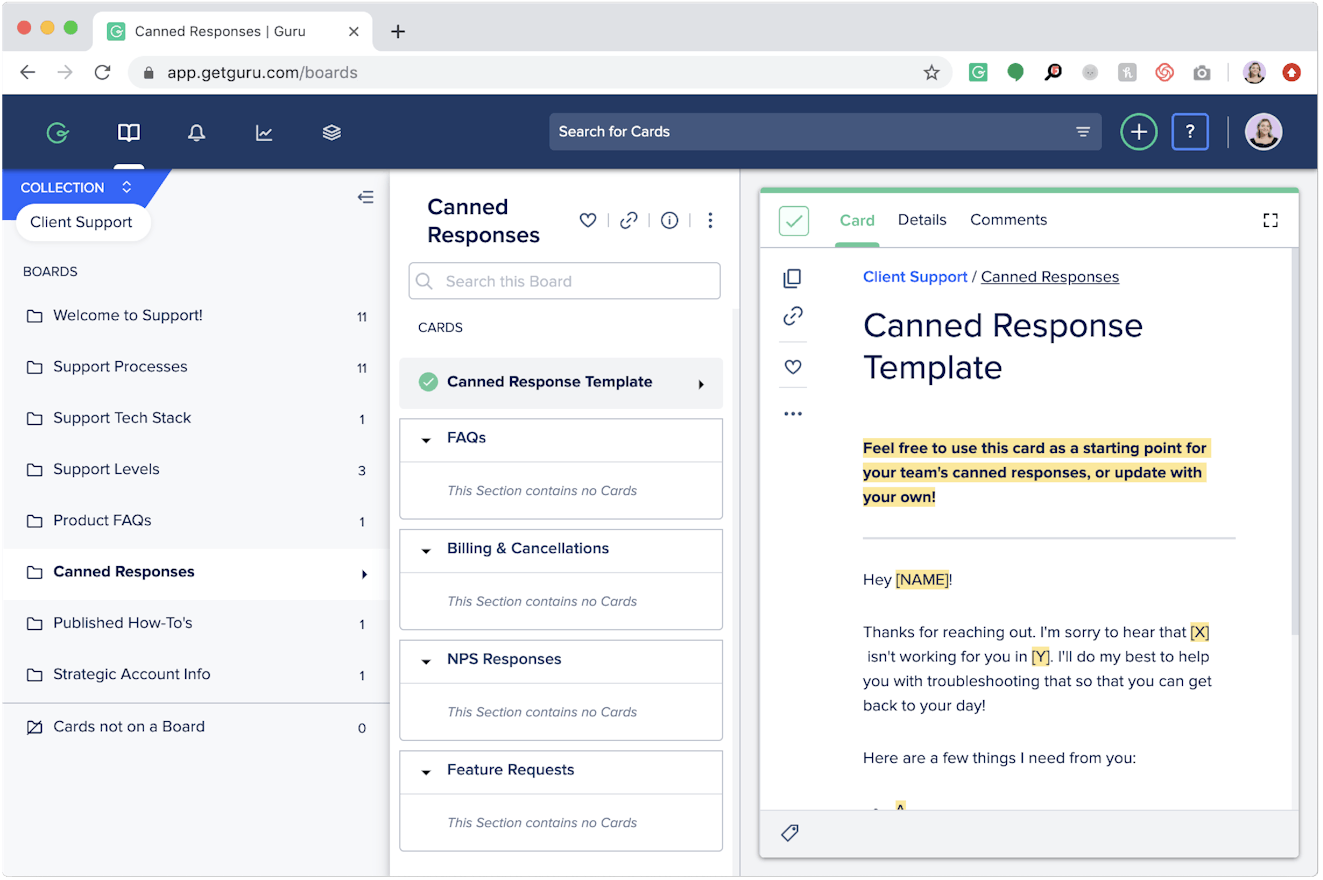AI Knowledge Base: An Essential Guide


As AI continues to transform digital landscapes, AI knowledge bases offer an opportunity to enhance traditional customer support with advanced machine learning.
With the potential to leverage intelligent algorithms to automate responses and provide personalized customer support, an AI-powered knowledge base enables businesses to improve service speed, increase accuracy, and provide consistent customer experiences at every touchpoint while reducing the workload for support teams.
In this AI knowledge base guide, we’ll explore what an AI knowledge base is along with its key components and benefits, helping you determine if an AI-driven knowledge base aligns with your business needs.
What is an AI knowledge base?
An AI knowledge base is a centralized repository for information integrated with artificial intelligence (AI) technologies. Unlike traditional knowledge bases, which serve as static repositories of information like FAQs, articles, and how-to guides, an AI knowledge base is dynamic. It leverages machine learning and natural language processing to learn from various interactions such as website behavior and customer feedback, enhancing its capability to deliver precise and beneficial information over time.
Benefits of an AI knowledge base
An AI knowledge base isn’t just a glossed-up version of a traditional knowledge repository. It has transformative, practical, and long-lasting benefits. Let's talk about some of them.
Improved customer service
When it comes to customer service, the quality of responses can significantly impact customer experience. An AI-powered knowledge base can understand inquiries posed in natural language, find information to help it formulate and deliver the most relevant responses, and predict future queries to provide preemptive solutions. This leads to near-instantaneous, precise, and appropriately contextual assistance, resulting in a much-improved customer service experience.
Faster response times
Over 80% of consumers say an immediate response is important when they have a customer support concern, and that number is even higher when it comes to sales or marketing questions (90%). Fortunately, this is where AI knowledge bases shine — by significantly reducing response times. Since AI aids support teams in responding to customer queries by facilitating quicker access to answers, integrating with the company's support platform to provide real-time resources, and enabling chatbots to deliver responses using AI-generated information from the knowledge base, customers won't have to wait long for their issues to be addressed.
Increased efficiency
AI knowledge bases can handle large volumes of queries autonomously, freeing up your customer service team to focus on more complex customer issues that require a human touch. This can bring about a dramatic improvement in operational efficiency, leading to increased productivity and, ultimately, cost savings.
Consistent experience across all platforms
Regardless of whether your customers engage with your business through a mobile app, website, or social media, an AI-powered knowledge base enhances their experience by ensuring consistency. While traditional knowledge bases typically offer static content with limited personalization and contextual understanding, an AI knowledge base tailors responses to individual customer needs and behaviors.
Additionally, while manual updates in traditional systems can lead to inconsistencies, AI knowledge bases leverage machine learning and natural language processing for real-time content updates, minimizing discrepancies. That means no matter where customers connect, they receive the same high-quality, relevant, and timely support, leading to better user experience and brand loyalty.
Types of knowledge base content
Knowing the type of content that populates a knowledge base is important for your knowledge management system’s effectiveness and can help you provide a seamless user experience.
In an AI knowledge base, the content generally falls into three categories: structured, unstructured, and automated knowledge content. Let's take a closer look at each of them.
Structured knowledge content
This type of content consists of information that’s organized in a predefined and easily understandable way. Examples include FAQs, troubleshooting guides, how-to articles, user manuals, and glossaries. Since the information is classified into distinct categories, it is easy for both the AI and the users to navigate through the content and locate the information they need.
Unstructured knowledge content
Unstructured content refers to information that doesn't have a predefined format or isn’t categorized into specific fields. Examples include customer emails and messages, social media interactions, support history, and chat logs.
While unstructured data presents a unique challenge in terms of organization, a well-designed AI knowledge base can extract valuable insights from this data by utilizing advanced AI algorithms for text analytics and sentiment analysis.
Automated knowledge content
With automated content, machine learning and natural language processing come together to generate responsive and user-specific content in real-time, like instant replies to inquiries via a chatbot or surfacing the most relevant knowledge base articles based on a user's context. The AI can even identify common questions and craft customized responses using successful past interactions as learning material, as well as uncover potential gaps in knowledge base content.
Personalization is key here, and AI assists with this by leveraging prior interactions, user preferences, and the context of the query to provide accurate and relevant content quickly, either directly to the customer or to the support staff assisting them.
Natural Language Processing (NLP) and Machine Learning (ML) in AI-powered knowledge bases
To fully appreciate the power of an AI knowledge base software, you need to understand two fundamental technologies that make it work: Natural Language Processing (NLP) and Machine Learning (ML).
Natural Language Processing (NLP)
NLP is a branch of artificial intelligence that helps computers understand, interpret, and generate human language. NLP takes into account the context and intent of the query, not just isolated keywords. This means the system can generate much more precise and relevant responses, increasing the overall quality of support.
Machine Learning (ML)
ML is a method of data analysis that automates the building of analytical models. It's a branch of artificial intelligence based on the idea that systems can learn from data, identify patterns, and make decisions with minimal human intervention.
How NLP and ML work together in a knowledge base
Although NLP and ML are distinct technologies, they complement each other in the context of an AI knowledge base. They work together to significantly enhance the performance of the knowledge base in providing relevant, timely, and accurate information to users.
The process begins when the user submits a query to the knowledge base. NLP comes into play by deciphering the user's natural language query and translating it into a format that the system understands. It identifies the keywords and key phrases as well as the intent behind the query.
Once the query is understood, ML takes over. Using data from past user interactions and learning patterns, ML identifies the most relevant information available in the knowledge base and tailors the search results based on contextual information. Additionally, ML algorithms track the success of the answers provided and use this feedback to refine future responses further.
AI-powered knowledge base platforms
Here are a few AI knowledge base tools that can transform your knowledge base into an efficient, user-friendly resource.
1. Korra
Best AI knowledge base for extensive content analysis.

Korra is a knowledge base platform that utilizes AI to enhance and streamline customer support experiences. With a primary focus on improving search accuracy and identifying content gaps, Korra uses NLP to deeply analyze your content. Additionally, it provides an advanced insights engine, internal knowledge resource for teams, and a quick-access data system to support agents effectively in their tasks.
Korra offers three deployment options: a widget for AI chat support, a portal for a traditional knowledge base experience, and an SDK for seamless integration.
2. Slite
Best AI knowledge base for collaborative internal document management.

Slite aims to simplify the process of creating, managing, and finding company information. At its core, Slite is dedicated to providing a single source of truth for company knowledge. The platform emphasizes its use as an autopilot for company knowledge bases, aided by AI to promote efficient collaboration.
One of Slite's standout features is its AI support for content writing. It leverages AI to translate text, fix spelling and grammar mistakes, condense long text, modify tone and language, and even provide summaries for long documents.
The platform also features an AI-powered assistant that generates answers in seconds, enhancing the experience of a traditional search and reducing response times when finding information.
3. Guru
Best AI knowledge base for real-time information sharing.

Guru positions itself as an AI-powered knowledge management solution that helps teams create a centralized source of shared knowledge. By capturing and sharing knowledge across commonly used apps, it bridges the gap between information scattered across multiple resources and provides a unified knowledge base that's easily accessible.
The platform's AI Suggest feature is an AI-powered search tool that uses machine learning to recommend the most relevant information to users. Guru's Verification tool also uses AI in its content verification process to flag outdated material, create alerts for authors, and suggest updates based on changes in the information landscape.
Coming soon: AI assist + Help Scout Docs
Help Scout is looking forward to expanding our AI assist feature — currently live in our inbox and Messages tool — into our knowledge base product, Docs.
Integrating AI assist in Docs means teams will be able to add an extra layer of polish to their help content and publish knowledge base articles more quickly, using AI to correct spelling and grammar mistakes, change the text’s tone, or even translate the copy into languages like Chinese, Spanish, Italian, and more.
Setting up your AI knowledge base
Integrating an AI-powered knowledge base into your customer support system can enhance your service by providing accurate information promptly, but setting up this tool requires thoughtful planning and ongoing management. This section aims to guide you through creating effective content for your AI knowledge base and monitoring its performance through meaningful metrics.
Creating and curating content for an AI knowledge base
Focusing on accuracy, relevance, and accessibility will help yield optimal results and provide the best customer support experience. Here are some guidelines to help you deliver valuable information to your customer base.
Creating quality content
Well-structured, relevant, and informative content is key to the effectiveness of your AI knowledge base. Here's how you can create top-quality content:
Understand your audience: Identify customer needs and pain points, and tailor your content to address them effectively. Knowing your audience will help you create content that resonates with your customers and provides them with solutions.
Simplify technical terms: Be mindful of technical jargon, as it can be confusing for customers. Use simple, clear language, and provide explanations for complex terms when necessary.
Be concise and organized: Write clear and brief content, using bullet points and subheadings to make it easier for customers to digest the information. Keep in mind that lengthy, dense text can be overwhelming and off-putting.
Use visual aids: Incorporate images, diagrams, or videos to clarify complex concepts or provide step-by-step instructions for customers. Visual aids can greatly enhance understanding and user experience.
Keeping content updated
To provide accurate and relevant information, you’ll want to keep your knowledge base content up to date. Stay informed of product updates, policy changes, and customer feedback, and regularly revisit your content to ensure its accuracy. Here are some tips for maintaining your content:
Monitor customer feedback: Pay attention to customer responses, queries, and complaints to identify gaps or issues in your content. Customer feedback can highlight areas that need improvement or suggest new topics to cover. Use your knowledge base system's internal tools to help monitor and solicit feedback.
Regularly review existing content: Periodically examine your knowledge base content to verify that it is still accurate and relevant. Make updates and revisions as needed, ensuring that customers receive the most current information. Some AI tools (like Guru, mentioned earlier) can flag out-of-date content, saving your team some time.
Assess content performance: Monitor content analytics to identify which articles or topics resonate with customers and which may require improvement. Analyzing user engagement and interactions can provide valuable insights for content refinement.
Plan for growth: As your company develops and evolves, so should your knowledge base content. Continuously update and expand your content to reflect new products, features, and service offerings.
Performance metrics and evaluation
Tracking key metrics can help you assess how well the AI system is functioning and make data-informed decisions to optimize its capabilities. Here are the main knowledge base metrics to consider:
Contact rate versus knowledge base visits: Comparing knowledge base traffic and contact rate helps you determine your documentation's impact and understand if your knowledge base content is providing the answers your customers need.
Conversations resolved on first contact: This metric tracks the quality and accessibility of your knowledge base by measuring inquiries solved in a single response by sending a knowledge base article. A higher number here means you might be able to increase self-service by making your knowledge base articles more easily discoverable.
Failed searches: Monitoring specific search terms and failed searches helps identify gaps in your knowledge base documentation, paving the way for strategic improvements and better query-result alignment to enhance customer self-service.
Shaping the future of customer service with AI
At Help Scout, we believe that the true essence of customer service lies in the warmth and understanding that only a human can deliver, but that doesn't mean AI can't be an enormous value add to building a comprehensive knowledge base.
The goal of an AI knowledge base should be to assist customer support agents by handling routine queries, leaving complex and sensitive issues requiring empathy and nuanced judgment to humans. This harmonious blend of efficiency and personal care ensures a superior customer service experience.







